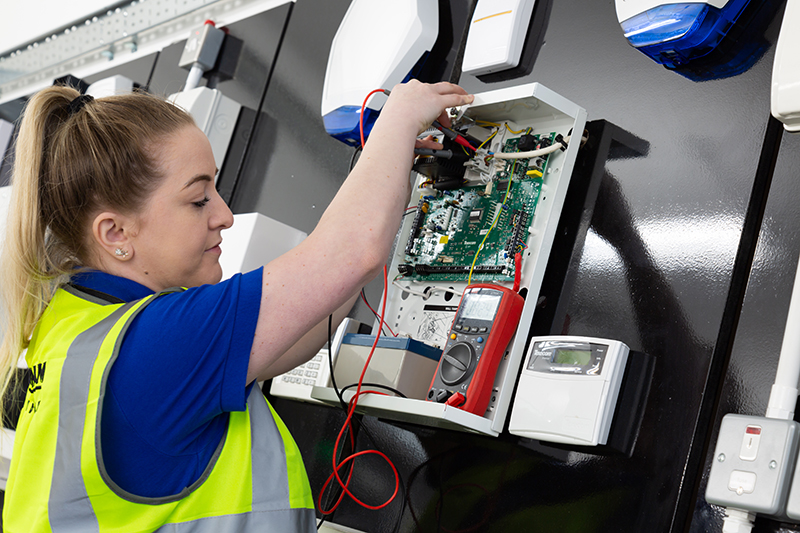Apprenticeships allow young people to experience employment whilst studying for a formal qualification – usually by dividing their time between their place of work and college, university, or a training centre. Here, IFSEC Global offers the top 10 things we think employers should know about this widespread alternative to higher education.
 1. Employers can choose a training provider
1. Employers can choose a training provider
Employers can select a training provider from the Register of Apprenticeship Training Providers and agree to a total price for the cost of training and assessment.
For an apprenticeship standard, this should include the cost of the end-point assessment which must be agreed with the provider the employer has selected.
The apprenticeship related to security and fire is called the Fire, Emergency and Security Systems Apprenticeship (FESS)…
The Fire, Emergency and Security Systems (FESS) Technician Apprenticeship Standard was launched following a Government Review of all apprenticeships across England, which found many to be unfit for purpose and developed without employer needs in mind.
The qualification leaves apprentices with the relevant skills in designing, installing and maintaining electronic systems to protect businesses, homes and properties against fires, break-ins and other emergencies.
2. The final review of an apprentice’s skills and knowledge are assessed in the End Point Assessment (EPA)
The EPA has been designed by the same Employer Group responsible for the Apprenticeship Standard, to ensure the apprentice is being assessed in line with the standard’s assessment plan, industry needs and current working practices.
It’s a comprehensive two-day assessment with practical skills tests in areas such as safe isolation, takeover of an existing installation, additions to existing systems and commissioning. Candidates’ knowledge on health and safety, electrical and electronic principles and a wide range of other areas is also tested and, importantly, a professional discussion is included to allow the candidate to demonstrate they have effective behaviours that will build and retain trust with customers and colleague.
What is the employer’s role on the EPA?
Your training provider should be asking you to sit down with them and your apprentice towards the end of their apprenticeship, to take an honest look at their current abilities and where the gaps are. If your apprentice can’t select at least ‘Adequate’ for every statement in the checklist, they’re unlikely to be ready for the assessment.
If there are areas where they’re not feeling confident, your training provider should produce an action plan to work on the items where they need more knowledge or practical experience.
Each party has to sign the checklist and submit it before the assessment can be booked. As an employer it’s vital that you do not sign the checklist until you’re confident they have the right level of skills and knowledge.
3. Hiring apprentices is an investment for businesses
Employers should view apprenticeships as capital investment, to account for both short and long run costs and benefits, as well as indirect costs and benefits.
Employers can expect to see a return on investment as apprentices gain company specific knowledge that will see them through a successful career in the business.
Apprentices also require less supervision in the long-run due to their extensive training programmes, thus also contributing to lower error rates.
4. When hiring apprentices, businesses must ensure they have:
- An apprenticeship agreement in place with their apprentice for the duration of the apprenticeship.
- A commitment statement signed by the apprentice, their employer, and the provider.
- A written agreement with providers, for employers who pay the apprenticeship levy and the apprenticeship service, they will need to have a contract for services with their main provider
- An apprenticeship in place for at least one year.
- The apprentice on the correct wage for their age, for the time they are in work, in off-the-job training and doing further study.
5. Typical duties carried out by a Fire and Security Engineer apprentice include:
- Observing, learning and understanding a wide range of engineering skills and techniques while under the supervision and instruction of a skilled engineering team.
- Learning the importance of Health and Safety and working responsibly within controlled environments.
- Following instructions with great attention to detail and care, as apprentices learn new skills, demonstrating they can perform complex tasks.
- Working to support the engineering team by completing all tasks allocated.
- Completing all training tasks allocated during block release weeks at college.
6. 86% of employers said apprenticeships helped them to develop skills relevant to their organisation
In a survey commissioned by the government in 2017, ¾ of employers highlighted ‘improved productivity, better quality of product or service, and higher staff morale’.


